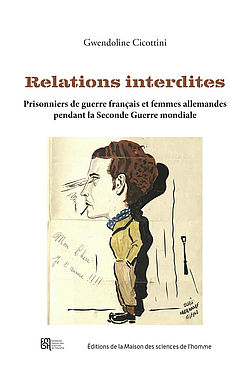Gwendoline Cicottini | Associate Postgraduate
Former Member
Home Institution
:
Aix-Marseille Université
|
Position
:
PhD Student in a Co-tutelle (Aix-Marseille Université / Tübingen Universität)
|
Disciplines
:
History
|
Scholarship
Januar - Dezember 2018: Stipendium der Gerda Henkel Stiftung
Novembre - décembre 2017: Aide doctorale partielle du CIERA
Oktober 2016 - Juli 2017: Stipendium der Studienstiftung des Abgeordnetenhaus vom Berlin
Researchtopic
History of the 20th Century - History of the Second World War - History of the sexuality and women
Title of thesis
Forbidden relationships, forgotten children ? The relationships between german women and french prisoners of war during the Second World WarSummary of thesis
Huge population displacement during the Second World War lead women and men to living together in a exceptional context. Among them, the french prisoners of war ended up in the Reich in which remained mainly german women. Due to work and everyday life, meetings were unavoidable and people established contacts, contacts which were forbidden, but didn't happen less often. Indeed, these acts were trivial : the exchange of food, conversations, sharing of intimacy. But they were interpreted as a political danger, as an affront to the racial ideas of the Third Reich, or an a harm to german morals. This paper tries to analyse these relationships in the light of the concept of fraternisation. In this particular context, the classic pattern of the occupier/occupied is reversed : it's not the man, as victorious soldier, who imposes his domination over the mostly female population, but the conquered man, taken prisoner, who ends up « occupied » among the victorious, among the « occupier », the german women. The inverted balance of power leads to many interrogations : Which form of fraternisation are these relationships taking ? Is there necessarily an implied political aspect behind the exchanged acts between these men and women ? And eventually, do we have to talk inevitably about fraternisation for these type of relationships ?
Supervisor
Forbidden relationships, forgotten children ? The relationships between german women and french prisoners of war during the Second World War
Huge population displacement during the Second World War lead women and men to living together in a exceptional context. Among them, the french prisoners of war ended up in the Reich in which remained mainly german women. Due to work and everyday life, meetings were unavoidable and people established contacts, contacts which were forbidden, but didn't happen less often. Indeed, these acts were trivial : the exchange of food, conversations, sharing of intimacy. But they were interpreted as a political danger, as an affront to the racial ideas of the Third Reich, or an a harm to german morals. This paper tries to analyse these relationships in the light of the concept of fraternisation. In this particular context, the classic pattern of the occupier/occupied is reversed : it's not the man, as victorious soldier, who imposes his domination over the mostly female population, but the conquered man, taken prisoner, who ends up « occupied » among the victorious, among the « occupier », the german women. The inverted balance of power leads to many interrogations : Which form of fraternisation are these relationships taking ? Is there necessarily an implied political aspect behind the exchanged acts between these men and women ? And eventually, do we have to talk inevitably about fraternisation for these type of relationships ?
Relations interdites Prisonniers de guerre français et femmes allemandes pendant la Seconde Guerre mondiale
May 16, 2024Gwendoline Cicottini
ISBN: 9782735129645
Au cours de la Seconde Guerre mondiale, 1,3 millions de prisonniers français se retrouvent sur le territoire du Reich. Gwendoline Cicottini aborde l’histoire peu connue des « relations interdites » entre ces prisonniers de guerre français et des civiles allemandes. Dès 1939, de tels contacts sont proscrits par le décret du Verbotener Umgang mit Kriegsgefangenen, pour des raisons de sécurité militaire et au nom de l’idéologie raciale nationale-socialiste. Cet ouvrage montre l’écart entre la norme et les pratiques individuelles, reflétant la difficulté de contrôler la population civile en période de conflit. Grâce à un corpus conséquent de dossiers judiciaires, mais aussi des entretiens qui redonnent la parole aux acteurs de cette histoire passée sous silence, l’historienne retrace ces relations, depuis les conditions de la rencontre amoureuse jusqu’au devenir des « enfants de la guerre ».
Au croisement de l’histoire de la Seconde Guerre mondiale, de la micro-histoire, du genre et du droit, son étude permet de mieux comprendre le fonctionnement de l’appareil judiciaire nazi et la situation des captifs français, mais aussi le quotidien d’une société civile en guerre marquée par de profondes mutations, le rôle de la sexualité et la fonction dévolue au corps des femmes. Elle contribue à aborder la guerre autrement, par le biais d’une histoire de l’intime, du sentiment et de la sexualité, et montre que ces relations interdites ont contribué à l’écriture d’une autre histoire des rapports franco-allemands qui contourne la volonté de l’État de contrôler les relations sociales et les corps de ses sujets.
Publications
- Gwendoline Cicottini, « Relations interdites, enfants oubliés ? Les relations entre femmes allemandes et prisonniers de guerre français pendant la Seconde Guerre mondiale », dans : Paul Maurice, Etienne Dubslaff, Maude Williams (dir.), Deutsch-französische Fraternisierungen in Kriegszeiten. Interdisziplinäre Ansätze zu den Fraternisierungen in den neuzeitlichen deutsch-französischen Konflikten (1799-1945) / Fraternisations franco-allemandes en temps de guerre. Perspectives interdisciplinaires des fraternisations lors des conflits franco-allemands contemporains (1799-1945), Steiner Verlag, Stuttgart, 2019, p. 133 - 150.
- „Child of foreigner: Franco-german children of war, seventy years after“ in Glaesmer H, Lee S (Eds.) (2015). Interdisciplinary perspectives on Children born of War – from World War II to current conflict settings. Conference reader, 2015. http://medpsy.uniklinikum-leipzig.de/medpsych.site,postext,rueckblick,a_id,1412.html.
